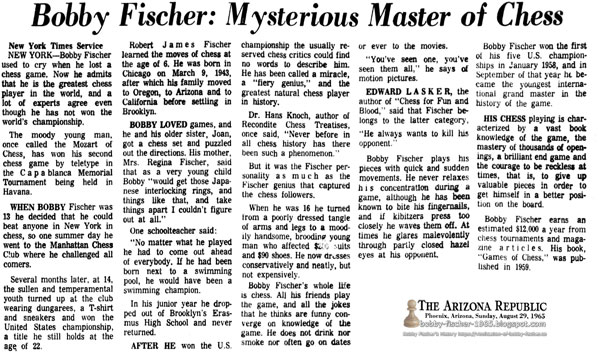Arizona Republic Phoenix, Arizona Sunday, August 29, 1965 - Page 27
Bobby Fischer: Mysterious Master of Chess
New York Times Service
NEW YORK—Bobby Fischer used to cry when he lost a chess game. Now he admits that he is the greatest chess player in the world, and a lot of experts agree even though he has not won the world's championship.
The moody young man, once called the Mozart of Chess, has won his second chess game by teletype in the Capablanca Memorial Tournament being held in Havana.
WHEN BOBBY Fischer was 13 he decided that he could beat anyone in New York in chess, so one summer day he went to the Manhattan Chess Club where he challenged all comers.
Several months later. at 14, the sullen and temperamental youth turned up at the club wearing dungarees, a T-shirt and sneakers and won the United States championship, a title he still holds at the age, of 22.
Robert James Fischer learned the moves of chess at the age of 6. He was born in Chicago on March 9, 1943, after which his family moved to Oregon, to Arizona and to California before settling in Brooklyn.
BOBBY LOVED games, and he and his older sister, Joan, got a chess set and puzzled out the directions. His mother, Mrs. Regina Fischer, said that as a very young child Bobby “would get those Japanese interlocking rings, and things like that, and take things apart I couldn't figure out at all.”
One schoolteacher said: “No matter what he played he had to come out ahead of everybody. If he had been born next to a swimming pool, he would have been a swimming champion.
In his junior year he dropped out of Brooklyn's Erasmus High School and never returned.
AFTER HE won the U.S. championship the usually reserved chess critics could find no words to describe him. He has been called a miracle, a “fiery genius,” and the greatest natural chess player in history.
Dr. Hans Kmoch, author of Recondite Chess Treatises, once said, “Never before in all chess history has there been such a phenomenon.”
But it was the Fischer personality as much as the Fischer genius that captured the chess followers.
When he was 16 he turned from a poorly dressed tangle of arms and legs to a moodily handsome, brooding young man who affected $200 suits and $90 shoes. He now dresses conservatively and neatly, but not expensively.
Bobby Fischer's whole life is chess. All his friends play the game, and all the jokes that he thinks are funny converge on knowledge of the game. He does not drink nor smoke nor often go on dates or ever to the movies.
“You've seen one, you've seen them all,” he says of motion pictures.
EDWARD LASKER, the author of “Chess for Fun and Blood,” said that Fischer belongs to the latter category.
“He always wants to kill his opponent.”
Bobby Fischer plays his pieces with quick and sudden movements. He never relaxes his concentration during a game, although he has been known to bite his fingernails, and if kibitzers press too closely he waves them off. At times he glares malevolently through partly closed hazel eyes at his opponent.
Bobby Fischer won the first of his five U.S. championships in January 1958, and in September of that year he became the youngest international grand master in the history of the game.
HIS CHESS playing is characterized by a vast book knowledge of the game, the mastery of thousands of openings, a brilliant end game and the courage to be reckless at times, that is, to give up valuable pieces in order to get himself in a better position on the board.
Bobby Fischer earns an estimated $12,000 a year from chess tournaments and magazine articles. His book, “Games of Chess,” was published in 1959.























